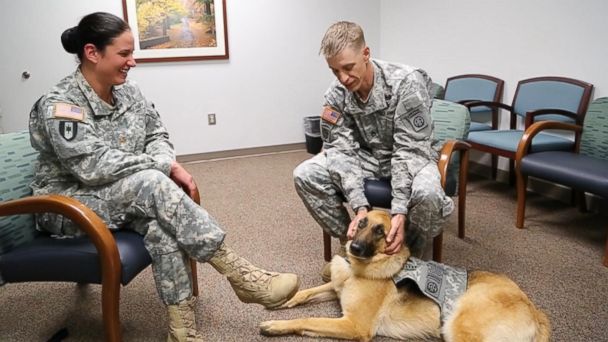Canines Help Soldiers Connect and Heal in Counseling
At Fort Bragg in North Carolina, Lexy, a 5-year-old German shepherd, is successfully persuading soldiers home from the war to come in and stick with counseling.
Related: One dog's powerful healing effects on two wounded veterans.
Staff Sgt. Dennis Swols said he originally wasn't interested in therapy at all, and certainly didn't believe that having a dog at his counseling sessions would help.
Swols, who has completed seven tours in Afghanistan and Iraq, suffered from post-traumatic stress disorder so severe that he experienced seizures. He said even his kids knew not to sneak up on him from behind.
"I can say the first time I killed someone, I cried," Swols said. "And I never went and got help."

Michael Koenigs/ABC News
It took the friendship of military therapy dogs like Lexy to get Swols to see past his pride and agree to work with his therapist. The dog lies next to him during his sessions, and pulls even closer when the conversations get difficult and Swols is stressed. He said Lexy had made a difference in his life.
"Without a doubt, without a doubt," Swols said. "I could tell a story. I could cry. I could do anything and she's not going to judge me."
Today there are 2,500 dogs trained in the armed services but Lexy and the dogs at the Warrior Canine Connection in Brookville, Maryland, are among the first to be used to help soldiers heal their minds.
At the Canine Warrior Connection facility, Rick Yount begins training therapy dogs when they're puppies. They learn to sense a soldier's distress.
"We know that emotions have a chemical component to them," Yount said. "These dogs are basically able to detect through scent, your emotional state."
In Bethesda, Maryland, 3-year-old Labrador retriever mix Ron has been trained to bring soldiers both tissues and comfort during therapy sessions. The work these dogs do is so important that the armed services gives these canines military ranks. Lexy is a Lt. Col. and Ron is a one-star general.
"It can comfort them [the soldiers.] Get them through the hard stuff," said psychiatrist Maj. Christine Rumayor who works with Lexy at Fort Bragg. "So they can keep talking and work through their issues."
ABC News' Michael Koenigs contributed to this story.
http://abcnews.go.com/blogs/health/2014/05/27/canines-help-soldiers-connect-and-heal-in-counseling/